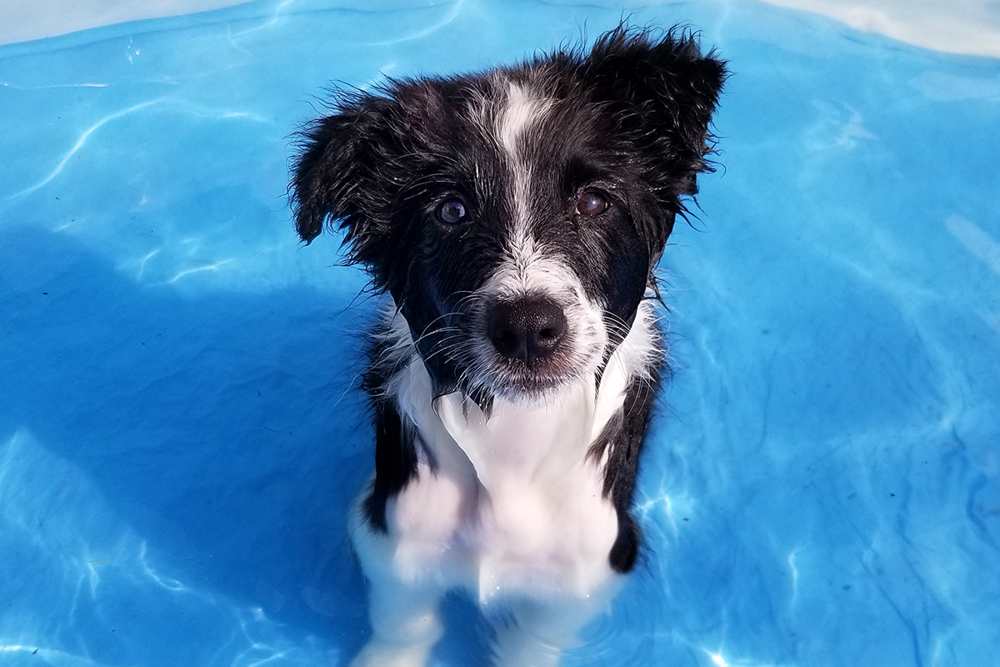Don’t let these hot-weather hazards ruin your pet’s summer.

Dehydration
As if you couldn’t tell by the lovable lump of fur lying on his side, tail switching lazily, hot days can take a lot out of your pet! It’s not just idleness, either—dogs and cats can get dehydrated very easily in the summer heat. Of course, you’ll want to be certain they have lots of freshwaters to drink, says David Dilmore, DVM, a veterinarian at Banfield Pet Hospital in Denver.
On hot days, make sure your dog has 1 ounce of water daily for every pound of weight (e.g., a 47-pound dog should drink 47 ounces of water). Cats need 4 ounces of water for every 5 pounds of weight (e.g., a 10-pound cat should drink 8 ounces of water). Refill bowls regularly, or place an extra one in an area where your pet likes to hang out, says Heidi Cooley, DVM, of Banfield Pet Hospital in Vancouver, WA and consider chilling the water with ice cubes. Finally, keep an eye on your pet’s mouth: A dog who is well hydrated will have moist, shiny gums that do not feel sticky.
Sunburn
Sunburn is not just for humans—or furless cats like Dr. Evil’s Mr. Bigglesworth. And it carries the same risks for pets as for us: pain, peeling, and possibly even skin cancer. Dogs with pink skin and a short coat—such as bull terriers, German shorthaired pointers, and boxers—are particularly vulnerable to sunburn.
So before your furbaby spends time outdoors, make sure they’re well protected with a sunscreen that’s specially formulated for pets, in lotion or spray form, with at least SPF 15. Apply to the tip of the nose and on the ears, abdomen, and any other area where the skin is exposed. “Reapply every three to four hours, or more frequently if your pet goes in the water,” Cooley says.
Pests
Bugs are worse in summer—even lowly humans realize that. While you should protect your pet from fleas, ticks (which carry Lyme disease), and mosquitoes (which can cause heartworm) throughout the year, you’ll want to be especially vigilant in the warmer months, Dilmore says. Try over-the-counter flea and tick collars.
Tablet medications are good too—if you can trick your pet into taking a pill. Every dog and cat is different, so talk to your vet about the best form of prevention for intestinal parasites, such as giardia. Many are only good for a fixed amount of time (say, a month), so set a calendar reminder to prompt you to re-up.
Heatstroke
Even animals who are well hydrated can get heatstroke. If you notice that your dog or cat is panting excessively, has brick-red gums, or just looks anxious, Dilmore says, your pet may be suffering from heatstroke, which requires immediate medical attention. Don’t try to cool down your pet in an ice bath—it can be dangerous. Instead, place cold water on just their paws. Prevent heatstroke altogether by keeping your pet in a room that is air-conditioned or has a running fan.
Although there is no critical temperature to avoid, limit time outdoors on very warm and humid days. Because of their short snouts, breeds such as bulldogs, Boston terriers, pugs, and boxers, as well as Persian and Himalayan cats, have a harder time breathing and cooling down. This puts them at higher risk for heatstroke.
Related:
7 Summer Safety Tips For Dogs That Could Save Your Dog’s Life, I Can’t Believe I Never Knew This!

